| Reviews & Columns |
|
Reviews DVD TV on DVD Blu-ray 4K UHD International DVDs In Theaters Reviews by Studio Video Games Features Collector Series DVDs Easter Egg Database Interviews DVD Talk Radio Feature Articles Columns Anime Talk DVD Savant Horror DVDs The M.O.D. Squad Art House HD Talk Silent DVD
|
DVD Talk Forum |
|
|
| Resources |
|
DVD Price Search Customer Service #'s RCE Info Links |
|
Columns
|
|
|
Puppet On A Chain
Tough, atmospheric Alistair MacLean thriller. Scorpion Releasing (which is fast becoming one of my favorites for their dedication to releasing these cool 60s, 70s, and 80s exploitation titles) has released Puppet on a Chain, the 1972 international dope smuggling actioner from Cinerama Releasing, based on the 1969 novel of the same name, starring Sven-Bertil Taube, sexy Barbara Parkins, Alexander Knox, Patrick Allen, Vladek Sheybal, Ania Marson, and Penny Cadagli. With MacLean adapting his own novel here, Puppet on a Chain sticks close to that non-stop driving action world of sudden violence, easy death, ruthless villains, and relentless, cynical heroes that MacLean described so well in his international best-selling potboilers. A small, unsuccessful release here in the States in 1972, and infrequent airings on TV decades ago, make this widescreen Scorpion title a real find for lovers of early 70s spy/action flicks―aided by Scorpion's excellent array of bonuses, including a fact-filled commentary track, an alternate scene, and an original trailer.
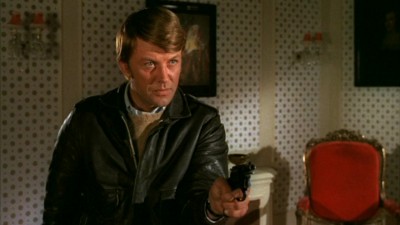
When three dope-smoking hippie drug-dealers get wasted by "the assassin" (Peter Hutchins) in a mansion outside of Los Angeles, it's time for the U.S. government to track down the European source of heroin that's causing this mini drug war. Enter Paul Sherman (Sven-Bertil Taube), a U.S. agent originally born in Holland (in the book he's with INTERPOL, but here his specific branch of U.S. law enforcement/intelligence is left unnamed) and sent by Washington to gain the cooperation of Amsterdam's Chief of Police, Colonel De Graaf (Alexander Knox)...who makes it very clear he doesn't like foreigners messing around in Dutch affairs. Sherman's direct liaison, Inspector Van Gelder (Patrick Allen), is far more sympathetic to Sherman's mission: his grown daughter, Trudi (Penny Casdagli), has mentally reverted back to a child after nearly dying from a heroin overdose. Sherman's contact in Amsterdam is former ally Maggie (Barbara Parkins), a deep cover agent from Washington unknown to the Dutch authorities. When Sherman arrives at his hotel, he's "made" almost immediately, but after a brutal (and fatal) encounter with "the assassin," he has the clues he needs to track down the dope ring that uses, among other items, large wooden dolls to smuggle their poison.
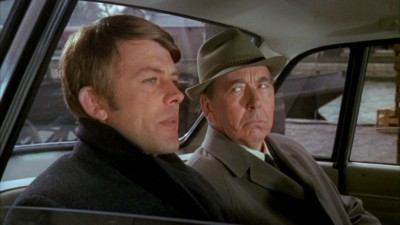
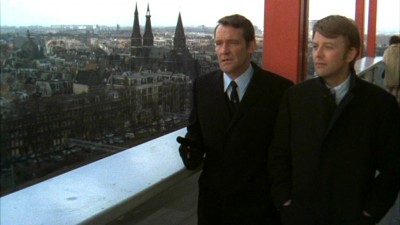
I haven't seen Puppet on a Chain since the mid-seventies when it popped up on the CBS Late Show. I remembered the boat chase and that's about all...for that matter, maybe I didn't even see the movie itself but just remembered the promo for it (those CBS Late Show promos were justifiably famous for their electric hard-sells). Either way, Puppet on a Chain might as well have been completely new to me until this Scorpion disc arrived last week (as for the storyline, decades ago I went through a period where I read everything by MacLean; they're addictively consumable...but they tend not to stay on the stomach too long). From what I can gather, the critics were largely indifferent to the movie, and the box office was slight (that could have been due to Cinerama's last gasp as a releasing company, as well as the lack of a big-name star to bring in the public). By this time, though, literary critics were ignoring MacLean's sales and becoming more aggressive in picking apart his novels, dismissing their verve and relentless plotting and focusing on the weaknesses of his characterizations and motivations. So touting a movie like Puppet on a Chain or the equally unsuccessful When Eight Bells Toll (1971) as coming from the man who brought you Where Eagles Dare and The Guns of Navarone wasn't going to be a surefire bet at the box office anymore (and by the time we're talking about later efforts like Caravan to Vaccarès and Bear Island, critics and audiences stayed away in droves).

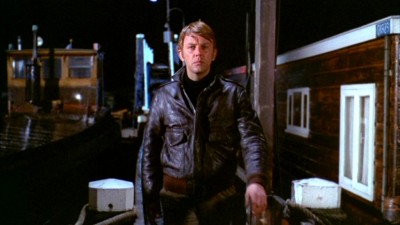
Certainly, Puppet on a Chain doesn't have the cache of MacLean's earlier cinematic adaptations. The budget here is limited compared to something like Ice Station Zebra's mammoth production (or even a glossy "lesser" effort like The Satan Bug, under MacLean's "Ian Stuart" pen name), with a quote unquote "no name" cast headlined by an actor completely unfamiliar to American audiences not exactly helping to create a stampede to the ticket windows ("no name" isn't meant as a pejorative―it's meant strictly in the context of box office: good actors Steve McQueen and Faye Dunaway put asses in the seats in 1972; good actors Sven-Bertil Taube and Barbara Parkins did not). Those familiar with MacLean's work can appreciate Puppet on a Chain's fidelity to his potboiler worldview, though, and fans of early 70s espionage/action films will enjoy the gritty, realistic, relatively straightforward suspense elements that were already in marked contrast to contemporary efforts like the daffy, delightful Bond entry, Diamonds Are Forever (realistic elements that look better and better when compared to the self-serious, self-conscious, rapid-fire silliness that marks the Bournes and Bonds of today).
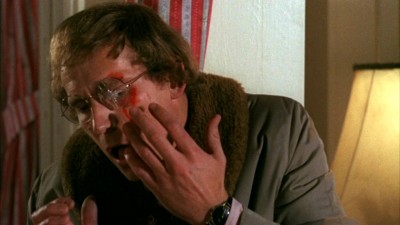
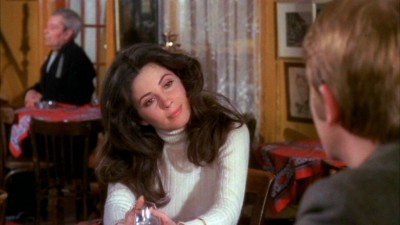
That limited budget is immediately apparent at Puppet on a Chain's opening, when that obviously faux-California mansion is visited by "the assassin," with the director(s) going for a hasty over-the-shoulder, hand-held fisheye lens traveling shot of the kills, with composer Piero Piccioni's gonzo synth music helping to lay down a sleazy, ultra-cheap feel to the sequence. Puppet on a Chain smoothes out after this AIP drive-in exploitation-like opening, to a more traditional visual approach associated with its legendary cinematographer, Jack Hildyard (The Bridge on the River Kwai, The V.I.P.s, the original Casino Royale). However, I rather liked this aesthetic clash right up front; it unsettles you from the start. I suppose you might chalk that clash up to the fact that Puppet on a Chain lists two directors: Geoffrey Reeve (director of the notorious MacLean flop Caravan to Vaccarès, but better known as a producer of such films as The Shooting Party, Half Moon Street, and The Whistle Blower) and Don Sharp (director of the even bigger MacLean disaster, Bear Island, as well as much better entries like Hennessy, Callan, The Brides of Fu Manchu, and The Kiss of the Vampire). I couldn't find any info on who directed what, exactly (maybe Sharp only did the action sequences; maybe he finished the film for Reeve...or Reeve finished it for him), but the unusually emphatic on-screen credit for Don Sharp over the final freeze-frame image of Taube, crediting Sharp with directing the famous boat scene and "additional sequences" tells me someone wanted his obviously significant contribution to the movie made clear in a legal sense.
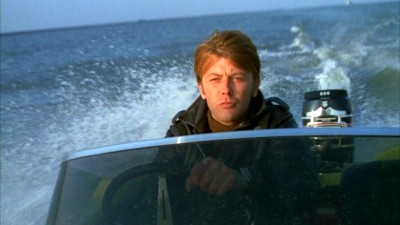
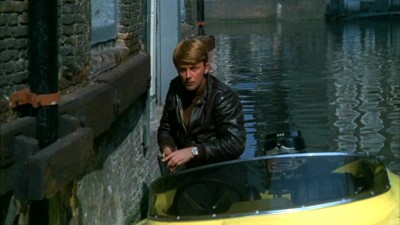
As for Puppet on a Chain's story, it's not particularly original in conception or plotting; it follows fairly standard undercover cop/spy conventions within the smuggling subgenre, and it has elements that one might even call derivative (the gentlemen on the excellent commentary track suggest SPOILER that Taube's audio torture by Sheybal is reminiscent of Live and Let Die's threat of snipping off Bond's fingertips, but a more apt comparison might be to Michael Caine's audio/visual torture in The I.P.C.R.E.S.S. File). You could spend a lot of time trying to figure out just what, exactly, is Parkins' character's purpose in the story (she's undercover...but why? And what info does she glean for Taube that he couldn't get for himself?), while other characters are built up to no payoff for the expectant audience, such as Allen's menacing maid, Herta, played by Henni Orri. That vagueness could be chalked up to an apparent post-production edit that chopped out significant characters (not insignificant supporting player Suzanne Leigh's entire part was eliminated from the final cut, from what I've read) and perhaps muddied the waters as to the plot (I'm still a little shaky on that whole business with Astrid's junkie brother knowing how to go to the church, with a hypo no less, looking for junk stashed in the bibles).
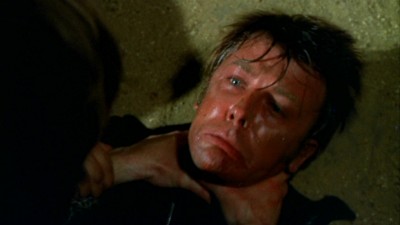
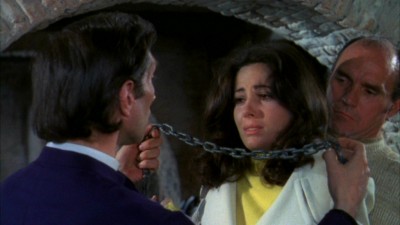
Confusion over Puppet on a Chain's convoluted plot, though (never really a big problem with these spy films―I'm not the only one who likes being in the dark with these spy mellers), quickly falls by the wayside because, thanks to MacLean's eventful script and the director(s)' punchy approach, Puppet on a Chain moves. Suspense is created almost immediately, not letting up until the (somewhat disappointing) final sequence. Straight-faced and driving, Puppet on a Chain doesn't have time for sex or jokes, something the gentlemen on the commentary track identify as the movie's main weakness, but the absence of which I found refreshing. MacLean always kept sex to the barest minimum in his books, anyway (we get a kiss or two between handsome Taube and gorgeous favorite Parkins before a chaste fade-out), and as for the jokes (Taube does make one or two dry, cynical jabs, such as his observation that his wife is "extremely happy"...now that they're divorced), the minute Taube cracked wise, critics and viewers would have cried, "Connery clone," and dismissed the character outright. Puppet on a Chain is all about keeping the story moving, with one action set-piece after another popping up to keep our interest.
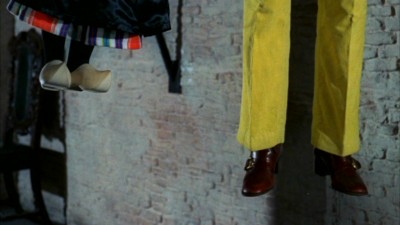
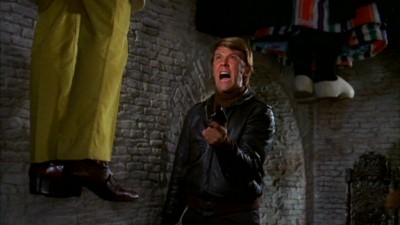
That no-nonsense drive translates to the excellent action sequences, as well. Utilizing unfamiliar, evocative Amsterdam locales, as well as good set design back at the Shepparton Studios, these set pieces give Puppet on a Chain a harder, no b.s. edge (helped again by no joking around) that action fans should respect. Taube, a good-looking, technically adept actor, is excellent here, projecting a cool, tough, watchful physical presence that would have left him in good stead as the next Bond (watch him weave slightly, like a coiled spring, coldly trying to judge the best angle for maximum damage before hitting "the assassin" in the back of the head―I've never seen that before in one of these kinds of movies. A nice touch). His fistfights are well choreographed (the one in the hold of the ship is particularly good, brutal and sustained, with Taube believably almost getting snuffed out), while other sequences have a grim, gritty feel that's most un-Bondian (SPOILER Parkins' death is well-staged; she's supposedly a pro agent...but she goes out screaming). Of course, everyone mentions the boat chase through the canals of Amsterdam now (it clearly influenced Live and Let Die's more elaborate and comical one). I found it remarkable not so much for the editing (SPOILER they unfortunately "cheat" Sheybal's impact before the explosion) but for the truly hairy stunts that go on, including one or two where you wonder if someone got killed (I particularly liked how the chase stops for a few tense moments to have Taube stalk Sheybal at crawling speed―another nice touch of suspense). After this hair-raising finale, the film's final sequence seemed a tad anti-climatic, with SPOILER Allen's descent down a deadly chain in keeping with the movie's motif about the dolls...and people...hanging from chains, but somewhat silly when he could have clearly rode the chain down by simply standing on the cleat. That's nitpicking, I know, but with everything else so nicely designed in Puppet on a Chain, it annoyed me...but only just, in this little gem of a 70s suspenser.
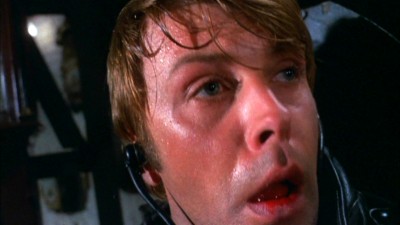
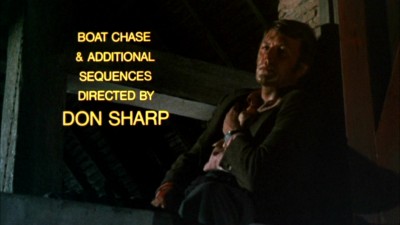
The DVD:
The Video:
The anamorphically enhanced, 1.78:1 widescreen transfer for Puppet on a Chain, described on the back of the DVD case as a "brand new 16x9 widescreen master in HD from the original IP," isn't perfect, with damage including scratches, tears, blotches, and sometimes muddy color. On the whole, though, it's not bad throughout most of the run time.
The Audio:
The English mono audio track is acceptable, with a bit of hiss, some popping, but overall, a decent-enough re-recording level. No subtitles or closed-captions.
The Extras:
Scorpion Releasing is becoming noted for these nice extras...although someone should check the proofing for their text: they spelled Taube's name wrong (and using that seemingly positive quote from Ebert's negative review of the film is quite funny...and dishonest. Use my quotes next time, Scorpion). First up is a full-length commentary track with Lee Pfeiffer, editor-in-chief of the marvelous Cinema Retro magazine and website, along with CR columnist Todd Garbarini, and film historian Paul Scrabo. This is the kind of commentary movie fans like myself love: plenty of info, trivia, and cogent commentary. Nice. An alternate scene is next (the bar scene, with a topless cocktail waitress, altered in the final print to get that PG-rating), and finally, a fun original trailer...with co-star Patrick Allen doing the gruff narration.
Final Thoughts:
Another winner from Scorpion Releasing. Not too many people have seen Alistair MacLean's Puppet on a Chain recently, so this widescreen transfer is welcome news for addicts of early 70s spy/action mellers. Sven-Bertil Taube is super-cool as a typically hard-nosed, driving MacLean hero, while the supporting cast is attractive. Great Amsterdam location work, realistic, hard-hitting action scenes, plenty of suspense, and that justifiably famous boat chase make Puppet on a Chain highly recommended viewing.
Paul Mavis is an internationally published film and television historian, a member of the Online Film Critics Society, and the author of The Espionage Filmography.


|
| Popular Reviews |
| Sponsored Links |
|
|
| Sponsored Links |
|
|
| Release List | Reviews | Shop | Newsletter | Forum | DVD Giveaways | Blu-Ray | Advertise |
|
Copyright 2024 DVDTalk.com All Rights Reserved. Legal Info, Privacy Policy, Terms of Use,
Manage Preferences,
Your Privacy Choices | |||||||













